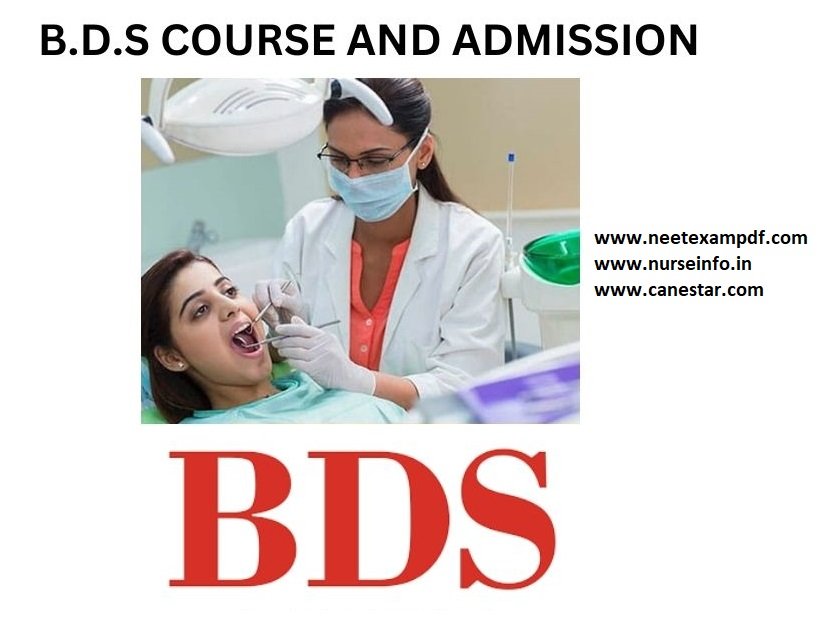B.D.S. – COURSE, ELIGIBILITY, DURATION, COURSE CURRICULUM, FEE STRUCTURE, CAREER OPPORTUNITY (ABROAD) AND SALARY
BACHELOR OF DENTAL SURGERY (B.D.S.) COURSE
BDS (Bachelor of Dental Surgery) is an undergraduate professional degree program in dentistry. It is a popular course in India for individuals aspiring to become dental professionals. Here is some information about the BDS course in India:
Duration: The BDS course in India typically has a duration of five years, including one year of mandatory rotating internship.
Eligibility Criteria: To be eligible for the BDS course, candidates must fulfill the following criteria:
- They should have completed 10+2 or equivalent examination from a recognized board.
- They should have studied Physics, Chemistry, Biology, and English as core subjects in their 10+2 curriculum.
- They should have obtained a minimum aggregate score in the qualifying examination (usually around 50%, but it can vary between institutions).
Entrance Examinations: Admissions to BDS courses in India are conducted through entrance examinations. Some popular entrance exams for BDS include the National Eligibility cum Entrance Test (NEET) conducted by the National Testing Agency (NTA), state-level entrance exams, and exams conducted by individual universities.
Curriculum: The BDS curriculum includes both theoretical and practical aspects of dentistry. It covers subjects such as Dental Anatomy, Physiology, Biochemistry, Pathology, Pharmacology, Oral Surgery, Orthodontics, Periodontics, Prosthodontics, and more. The course also includes clinical training where students get hands-on experience in treating patients under the supervision of qualified faculty.
Internship: After completing the four-year academic program, students are required to undergo a one-year rotating internship in a dental college or hospital. During this period, they gain practical experience in various dental specialties.
Career Opportunities: After completing the BDS course and obtaining registration with the Dental Council of India, graduates can work as dentists in private clinics, hospitals, or start their own practice. They can also pursue higher education in various dental specialties such as Orthodontics, Periodontics, Oral and Maxillofacial Surgery, Endodontics, Pedodontics, and more.
Registration: Upon completion of the BDS course, graduates need to register with the Dental Council of India or the State Dental Council to practice as dentists in India.
COURSE CONTENT
The BDS (Bachelor of Dental Surgery) course content in India typically includes a combination of theoretical knowledge, practical training, and clinical experience. Here are some of the key subjects and topics covered in the BDS curriculum:
- Preclinical Subjects:
- Dental Anatomy: Study of the structure, development, and arrangement of teeth.
- Dental Materials: Knowledge of various dental materials used in restorative and prosthetic dentistry.
- Dental Physiology and Biochemistry: Understanding the physiological and biochemical processes related to oral health.
- Basic Medical Sciences:
- General Anatomy and Histology: Study of the structure of the human body and tissues.
- General Physiology and Biochemistry: Understanding the normal functioning of the human body.
- General Pathology and Microbiology: Study of diseases and microorganisms related to oral health.
- Dental Sciences:
- General and Dental Pharmacology: Knowledge of drugs used in dentistry and their effects.
- General and Oral Pathology: Understanding oral diseases, their causes, and diagnostic procedures.
- Oral Medicine and Radiology: Diagnosis and management of oral and dental disorders.
- General Medicine and General Surgery: Basic knowledge of medical and surgical conditions relevant to dentistry.
- Clinical Dentistry:
- Conservative Dentistry and Endodontics: Procedures related to the preservation and restoration of teeth.
- Prosthodontics: Study of dental prosthetics, including fixed and removable dentures.
- Periodontology: Diagnosis and treatment of diseases affecting the supporting structures of teeth.
- Oral and Maxillofacial Surgery: Surgical procedures related to the mouth, face, and jaws.
- Orthodontics: Correction of dental irregularities and misalignments.
- Pedodontics: Dental care for children, including preventive and therapeutic treatments.
- Oral Pathology and Oral Microbiology: Study of oral diseases and microorganisms.
- Community Dentistry: Understanding oral health in the context of public health and community outreach.
FEE STRUCTURE
The fee structure for BDS (Bachelor of Dental Surgery) courses in India can vary significantly depending on the type of institution (government or private), its location, reputation, and infrastructure. Here is a general idea of the fee structure for BDS courses in India:
- Government Dental Colleges: Government dental colleges in India generally have a lower fee structure compared to private dental colleges. The fees in government colleges are subsidized by the government, making them more affordable for students. The approximate annual fee in government dental colleges ranges from ₹10,000 to ₹50,000 (Indian Rupees).
- Private Dental Colleges: Private dental colleges have a higher fee structure compared to government colleges. The fees in private colleges can vary widely and are generally higher than government colleges. The approximate annual fee in private dental colleges ranges from ₹2,00,000 to ₹5,00,000 or even more, depending on the institution.
- Deemed Universities: Some dental colleges in India are classified as deemed universities. These institutions have the autonomy to set their fee structure. The fee in deemed universities can be higher than private dental colleges and may range from ₹5,00,000 to ₹10,00,000 per year or more.
It’s important to note that the fee structure mentioned above is an estimate and can vary based on factors such as location, infrastructure, faculty, and other facilities provided by the institution. Additionally, the fee structure may be subject to change from year to year.
CAREER OPPORTUNTITY
Completing a BDS (Bachelor of Dental Surgery) opens up several career opportunities in the field of dentistry. Here are some potential career paths for BDS graduates in India:
- Private Practice: Many BDS graduates choose to set up their own private dental clinics. They can provide general dental services, preventive care, restorative procedures, and oral health consultations to patients. Running a private practice allows dentists to have independence, build a patient base, and establish their reputation in the community.
- Government Hospitals and Clinics: BDS graduates can work in government hospitals, dental clinics, and healthcare centers. These positions often offer a stable salary, benefits, and the opportunity to serve a diverse patient population. Government jobs may require qualifying competitive exams or fulfilling specific criteria set by government authorities.
- Academic Institutions: BDS graduates with a passion for teaching and research can pursue careers in academic institutions. They can work as faculty members, lecturers, or professors in dental colleges or universities. Teaching positions allow dentists to share their knowledge and expertise with aspiring dental students while engaging in research and contributing to the dental field.
- Public Health Sector: Dentists can work in public health programs and initiatives aimed at promoting oral health and preventing dental diseases at the community level. They may be involved in organizing oral health camps, conducting awareness programs, and providing dental services to underprivileged populations.
- Dental Industry and Corporate Sector: BDS graduates can find opportunities in the dental industry and corporate sector. They can work with dental product manufacturers, pharmaceutical companies, dental equipment suppliers, or dental insurance providers. Roles in sales, marketing, research and development, or product management are some possibilities.
- Specialization and Postgraduate Studies: After completing BDS, graduates can pursue specialization in various fields of dentistry by pursuing postgraduate courses like MDS (Master of Dental Surgery). Specialization areas include Orthodontics, Periodontics, Oral and Maxillofacial Surgery, Prosthodontics, Endodontics, Pedodontics, and more. Specialization enhances career prospects, opens up opportunities for advanced clinical practice, teaching, and research.
- Dental Research: BDS graduates interested in research can pursue careers in dental research institutes, universities, or pharmaceutical companies. They can contribute to scientific studies, clinical trials, and advancements in dental treatments, materials, and techniques.
SALARY IN INDIA
The salary of BDS (Bachelor of Dental Surgery) graduates in India can vary depending on various factors such as experience, specialization, location, type of practice (private or government), and individual skills. Here is a general overview of the salary range for BDS professionals in different career paths:
- Private Practice: In private practice, the income of a BDS professional can vary significantly depending on the location, patient flow, reputation, and marketing efforts. In the initial years, the earnings may be relatively modest, but as the practice grows and the dentist establishes a patient base, the income can increase. On average, a BDS dentist in private practice can earn around ₹50,000 to ₹1,00,000 per month or more.
- Government Hospitals and Clinics: Dentists working in government hospitals and clinics generally receive a fixed salary as per the government pay scale. The salary can vary based on factors such as experience, designation, and location. The starting salary for a BDS dentist in a government job can range from ₹30,000 to ₹50,000 per month. With experience and promotions, the salary can increase.
- Academic Institutions: In academic institutions, the salary of BDS professionals working as faculty members, lecturers, or professors can vary depending on the institution, experience, and qualifications. Entry-level salaries in dental colleges or universities may start from ₹40,000 to ₹60,000 per month, while senior and experienced faculty members can earn higher salaries.
- Public Health Sector: Dentists working in public health programs or government initiatives may have different pay scales depending on the role, location, and organization. Salaries in the public health sector can vary widely. Government-employed dentists in public health programs can earn salaries similar to those in government hospitals and clinics.
- Dental Industry and Corporate Sector: BDS professionals working in the dental industry and corporate sector, such as dental product manufacturers, pharmaceutical companies, or dental insurance providers, may have varying salary structures. Salaries can be influenced by the role, experience, and the organization’s scale. It is difficult to provide a specific range, as it can vary significantly.
SALARY IN ABROAD
The salary of BDS (Bachelor of Dental Surgery) professionals in countries abroad can vary significantly depending on the country, region, healthcare system, level of experience, specialization, and other factors. Here is a general overview of the salary range for BDS professionals in some popular destinations:
United States: In the United States, dentists earn relatively higher salaries compared to many other countries. However, it’s important to note that to practice as a dentist in the US, international dentists usually need to pursue additional education and obtain a dental license in the country. The average annual salary for general dentists in the US can range from $120,000 to $200,000 or more, depending on factors such as location, experience, and specialization.
United Kingdom: In the United Kingdom, the salary of BDS professionals can vary depending on the National Health Service (NHS) contracts, private practice, or employment in universities or hospitals. The average annual salary for a dentist in the UK can range from £35,000 to £80,000, depending on factors such as experience, location, and work setting.
Canada: In Canada, the salary of BDS professionals varies across provinces and territories. On average, the annual salary for general dentists in Canada can range from CAD $80,000 to CAD $150,000 or more, depending on experience, location, and practice setup.
Australia: In Australia, the salary of BDS professionals can vary depending on factors such as location, experience, and work setting (public or private). On average, the annual salary for dentists in Australia can range from AUD $70,000 to AUD $150,000 or more.
If you need more information, comment us below or email us.
Thank you.

